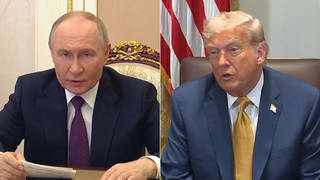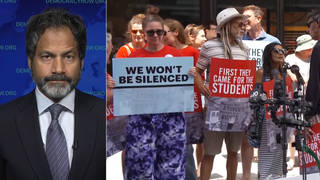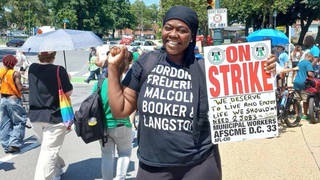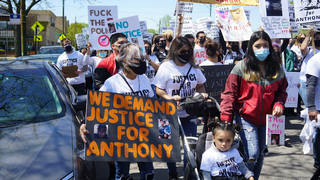
Guests
- Barbara Ransbyprofessor of African-American studies, gender and women’s studies and history at the University of Illinois, Chicago. She is the director of the Social Justice Initiative at the University of Illinois. Her books include the award-winning Ella Baker and the Black Freedom Movement.
For the first time in three decades, a Chicago police officer faces charges of first-degree murder for an on-duty shooting. White police officer Jason Van Dyke was arrested on Tuesday and is being held without bail for the killing of African-American 17-year-old Laquan McDonald. It was more than a year ago, on October 20, 2014, when Officer Van Dyke shot the teenager 16 times, including multiple times in the back. Police claimed McDonald lunged at the officer with a small knife. But newly released dash cam footage shows the teenager walking away from the police officers’ cars when another police car pulls up to the scene. The video, which has no sound, then appears to show Officer Jason Van Dyke jumping out of the car, pointing his gun at McDonald and opening fire. The teenager’s body spins as he is hit with the barrage of bullets and then falls to the pavement, where he continues to be struck by bullets. Officer Van Dyke remained on paid desk duty after the shooting until he was taken into custody on Tuesday. In addition to the fatal shooting last October, Officer Van Dyke had at least 18 civilian complaints against him, which included excessive use of force, illegal arrest and use of racial slurs. None of these complaints led to any disciplinary action. This week Chicago police announced they will also move to fire Officer Dante Servin, who killed 22-year-old African-American woman Rekia Boyd in 2012. We discuss the developments in Chicago with Barbara Ransby, professor of African-American studies, gender and women’s studies and history at the University of Illinois, Chicago.
Transcript
JUAN GONZÁLEZ: We begin today in Chicago, where for the first time in three decades a police officer faces charges of first-degree murder for an on-duty shooting. White police officer Jason Van Dyke was arrested on Tuesday and is being held without bail for the killing of 17-year-old Laquan McDonald, who was African-American. It was more than a year ago, on October 20th, 2014, when Officer Van Dyke shot the teenager 16 times, including multiple times in the back. Police claimed McDonald lunged at the officer with a small knife. But newly released dash cam footage showed the teenager walking away from the police officers’ cars when another police car pulls up to the scene. The video, which has no sound, then appears to show Officer Jason Van Dyke jumping out of the car, pointing his gun at McDonald and opening fire. The teenager’s body spins as he is hit with the barrage of bullets, and then he falls to the pavement, where he continues to be struck by bullets. This is Cook County State’s Attorney Anita Alvarez talking after the indictment about what happened at the scene.
ANITA ALVAREZ: Our investigation has determined that Officer Van Dyke was on the scene for less than 30 seconds before he started shooting, in addition to the fact that all evidence indicates that he began shooting approximately six seconds after getting out of his vehicle.
JUAN GONZÁLEZ: Officer Van Dyke remained on paid desk duty after the shooting until he was taken into custody on Tuesday. In addition to the fatal shooting last October, Officer Van Dyke had at least 20 civilian complaints against him, which included excessive use of force, illegal arrest and use of racial slurs. None of those complaints have led to any disciplinary action.
AMY GOODMAN: This week, Chicago Police Superintendent Garry McCarthy also announced he would move to fire Officer Dante Servin, who killed a 22-year-old African-American woman named Rekia Boyd in 2012. Officer Servin was off duty when he fired several shots over his shoulder into a group of people Boyd was standing with near his home, striking her in the back of her head. He was charged with involuntary manslaughter, making the first time in more than a decade that a Chicago police officer was charged for a fatal shooting. But last spring, in a dramatic dismissal, a judge acquitted Detective Servin on a legal technicality.
Well, for more on the deaths of Laquan McDonald and Rekia Boyd, we’re joined in Chicago by Barbara Ransby, professor of African-American studies, gender and women’s studies and history at the University of Illinois, Chicago.
We welcome you to Democracy Now!, Professor.
BARBARA RANSBY: Thank you.
AMY GOODMAN: Sixteen shots, 30 seconds, 400 days to indict the police officer for first-degree murder. All of those days he was paid. The number of officers at the scene, it’s not clear exactly from the video; it’s believed about seven, in addition to Van Dyke. The number who came to Laquan McDonald’s aid: none. Can you talk about the indictment yesterday just before the court-ordered video of the killing was released?
BARBARA RANSBY: Yes, well, thank you for having me, Amy, and for covering this issue. Yesterday, it was really after vigils and protests and lobbying and all kinds of pressure, young people marching in the streets, that the city was forced to release the videotape. And as you may have reported before, there was a tape in a local—a videotape in a local Burger King that’s still gone missing. So, we got the dash cam video. But the time that it has taken for the city to come forward with this is really pretty outrageous, and that’s what activists in the city have been saying. That’s what led to thousands of people protesting in the streets of Chicago last night. Still, a young man is in custody for those protests, and we’re very concerned about him—Malcolm London, who is a young poet and activist here.
But I was so disturbed by that videotape, not that we haven’t seen other disturbing videotapes, but the amount of callous disregard for this young man laying in the street. The police shot him so quickly, so many times, and the other police, as you just pointed out, did not do anything to see if he was even still alive, kicking the knife out of his hand.
And, you know, the thing that strikes me, WBEZ, our Chicago public radio, just reported the other day, because of the budget cuts in Illinois and other priorities, Chicago Police Department only has less than 20 of its officers have received crisis intervention training. Now, it seems like that ought to be a priority for de-escalating this kind of situation. It seems that the police have a lot of training in how to contain protesters, but very little training in something that would be quite common, which is to de-escalate a situation where someone is intoxicated, mentally ill or otherwise behaving irrationally. We needed a nonlethal intervention there, clearly, but it seemed to be almost too much trouble to do anything other than to shoot this child. And that’s why activists are so angry.
JUAN GONZÁLEZ: And, Professor Ransby, I wanted to talk to you about the role of Chicago Mayor Rahm Emanuel, because, clearly, the mayor had said that he had not previously seen the video, yet he must have approved the $5 million settlement that was given to the family earlier this year, even before the family had filed a lawsuit.
BARBARA RANSBY: Well, absolutely. I mean, whether the mayor saw the video personally or not, someone in the Mayor’s Office must have seen the video. They must have known the likelihood that this officer would be found culpable of murdering this child. Otherwise, that size of a settlement—for a cash-strapped city, as we’re often told—would not have been approved. Of course, we would expect a conscientious mayor to want to see such a video of this kind of killing. And given the attention that police violence has gotten across the country, and given the legitimate anger of many in the African-American community, the question would be: Why didn’t the mayor see the video sooner? And that, you know, I think, is a legitimate question.
AMY GOODMAN: At a news conference on Tuesday, the Chicago mayor, Rahm Emanuel, who was also President Obama’s chief of staff before that, said police officer Jason Van Dyke violated basic moral standards.
MAYOR RAHM EMANUEL: Obviously, in this case, Jason Van Dyke violated both the standards of professionalism that comes with being a police officer, but also basic moral standards that bind our community together. Jason Van Dyke will be judged in the court of law. That’s exactly how it should be. As of today, he’s no longer being paid by the city of Chicago, as the superintendent just noted, and he was stripped of his police powers 10 months ago. Obviously, anyone that sees this video will also make their own judgments.
AMY GOODMAN: So, Barbara Ransby, if you could explain the chronology here—I mean, we’re talking about a killing that happened over 400 days ago. The city fights to suppress the video. They give $5 million to the family, though the family did not even sue. The court, based on a FOIA request by an independent journalist, orders the video to be released. They said today was the deadline for that release. And so yesterday, after 400 days, the entire leadership of Chicago gathers—the superintendent and the mayor—and they announce that Van Dyke, the officer, will be indicted for first-degree murder for his reprehensible actions. He had been on the payroll all of that time. And then, as they left the stage, they released the videotape. How does Mayor Rahm Emanuel justify not having indicted—having this officer indicted before?
BARBARA RANSBY: Well, that’s an excellent question. And, of course, I can’t answer that, but that would be my question, as well. That was the question of the many, many activists who took to the streets in Chicago last night. And, you know, when the mayor and the state’s attorney, Anita Alvarez, tell us that they were saddened, outraged, disturbed when they saw the video, I mean, it is really very little, very late. You know, Dr. King and others have referred to the long arc of justice and, you know, that long arc of justice bending slowly. This is a very, very slow arrival at, you know, a remotely just outcome. I mean, the real just outcome would be to have a police department that was in fact accountable, to have swift investigations and transparency, to make data available to people without having the kind of protests and lawsuits and pressures that have been necessary heretofore.
So, you know, I think it really behooves the mayor to rethink the approach. It is very legitimate that people are calling into question the leadership of Garry McCarthy, the police chief in the city. So, you know, we understand the anxiousness. We understand the anger of young people in the streets. I mean, this incident should not have happened. And if it should have happened, our leadership should have had a swift and clear response, and that response should have been transparent. And in this case, by all indicators, it simply was not.
JUAN GONZÁLEZ: And, Professor, could you put this in context of the ongoing and historical problems that citizens of Chicago, and the black community, especially, have encountered with the police? I mean, I think there was a report by Truthout earlier this year that the Chicago police were—appear to be officially undercounting the number of people killed by the police. But talk about this historical problem in the city.
BARBARA RANSBY: Right. Well, there’s the specific issue of undercounting and making data available, which has been an ongoing problem. But, of course, Chicago is the place where Jon Burge, the former police supervisor, carried out systematic torture of young black men in the police district, including electroshocking genitals and putting plastic bags over the heads of people that they were trying to coerce into confessions. All of this has now been documented. Many of his victims have been exonerated. But the fact that this could go on for over a decade in Chicago suggests some very, very deep-seated issues of racism and corruption in the police department. And that has to be taken very, very seriously. That is a part of the legacy that we are confronted with right now. Of course, even going back to the assassination of Fred Hampton, the Black Panther Party leader and NAACP leader, in 1969, where the Chicago Police Department was implicated in his murder, you know, there is a question of confidence, of accountability, of cover-up.
But unfortunately, it’s not just Chicago. African-American communities around the country have been at odds with police departments that have been insensitive to black communities, that have engaged in racial profiling, and that have been all too quick to use lethal force against young black bodies—black and Latino people, in general, but black people, in particular. And I think that’s why we’ve seen the Black Lives Matter movement garner so much support. That’s why we’ve seen young people in the Black Youth Project 100 be so vigilant in exposing the kind of police abuse that we’ve seen here in Chicago and elsewhere. So, it is coming out of a historical context, but it also transcends Chicago.
AMY GOODMAN: The head of the police has called for the firing of Dante Servin. In May, we spoke to Martinez Sutton, the brother of 22-year-old Rekia Boyd, who was killed in 2012 by off-duty Chicago police detective Dante Servin. Cook County Judge Dennis Porter acquitted the officer, saying he shouldn’t have been charged with involuntary manslaughter. I asked Rekia Boyd’s brother, Martinez, if he should have been charged with murder.
MARTINEZ SUTTON: The judge said it should have been murder charges put on the officer, instead of involuntary manslaughter, and also said that he can’t be intentional and reckless at the same time. And we had second-degree murder charges on him at first, before they announced it. But at the last minute, once they found out I talked to the officer, they changed it to involuntary manslaughter to further protect him.
AMY GOODMAN: What do you mean, once you talked to the officer?
MARTINEZ SUTTON: Well, I was doing a documentary for my school, and as we were shooting the documentary, he pulled up in the same car that he killed my sister in. And he gets out the car and said, “Who are you people?” And they said, “This is Martinez Sutton, Rekia Boyd’s brother.” And he looked surprised, and he was like, “You’re Rekia’s brother?” I said, “Yes, I am.” And he said, “Can I get a hug?” So I stared at him for a sec, and I embraced him. And he started with, “I’m so sorry. I’m so sorry. I didn’t mean to kill your sister. I’m so sorry. Your sister was innocent. But I tried to kill that MFer. Ooh, I wish it was him that I shot in the head, instead of your sister. Ooh, I wish it was him that was dead.” Then he went back to “I’m so sorry. Now my heart is clear. I pray to the three Marys across the street every day, every time I leave this alley.” How can you wish somebody was dead? How can you wish somebody else’s life was taken? Why do you want to take somebody’s life off this Earth?
AMY GOODMAN: The brother of Rekia Boyd. Now the Chicago police superintendent is saying he’ll move to fire Dante Servin, the off-duty officer, for the death of Rekia Boyd. We only have a few more minutes, Professor Ransby. Describe why this case is so significant today. You have a 17-year-old teenager, Laquan McDonald, who was gunned down 400 days ago, and then you still have this case of Rekia Boyd from 2012 that continually, as people march in the streets, they raise her name, as well.
BARBARA RANSBY: Yes, I mean, I’m glad you mentioned Rekia Boyd, because it is her murder that really has galvanized enormous outrage and energy for those fighting for justice in Chicago. It was another outrageous, you know, seemingly clear-cut case of reckless and brutal behavior, this time on the part of an off-duty police officer, who has just only recently been fired—again, very late in the game. And in some ways, the activists here have done the job of the city leadership by bringing this issue to the fore, by keeping it in the forefront of public consciousness, and demanding justice when those in leadership have been very reluctant to deliver it.
So, I think we’ll continue to see protests in Chicago. We’ll continue to see the very passionate demand for justice for young black people. And sadly, Rekia Boyd and Laquan McDonald are not the only ones. Damo Franklin was another young man who was tased by Chicago police and later died, which inspired young people to go to the United Nations to protest the consistent abuse of young black people by Chicago Police Department.
AMY GOODMAN: We want to—
JUAN GONZÁLEZ: And I just wanted to ask you, quickly, the impact of these numerous—now we’ve had dozens of, literally, videos showing these kinds of assaults by the police on African Americans, sometimes Latinos, as well—the impact of these videos nationwide on the national consciousness?
BARBARA RANSBY: I mean, it’s had enormous impact, of course. I think one impact is trauma. Those of us who have seen these videos over and over really are reminded of the days of lynching. The We Charge Genocide group here in Chicago says that, you know, in the Jim Crow era, the rope was a symbol of lynching, and today it’s a police bullet. So, there has been trauma. But I also think it has galvanized people who want to not only confront issues of police violence, but the larger conditions of injustice that these communities suffer, that need to change in order for us to really have both peace and justice.
AMY GOODMAN: Barbara Ransby, we want to thank you for being with us, professor of African-American studies, gender and women’s studies and history at the University of Illinois, Chicago, director of the Social Justice Initiative at the University of Illinois. Among her books, Ella Baker and the Black Freedom Movement.
This is Democracy Now!. We go directly to Minneapolis. One thousand Black Lives Matter protesters marched last night. The night before, alleged white supremacists opened fire on the protesters, shooting five of them. We’ll speak to an eyewitness, as well as Minneapolis Congressmember Keith Ellison. Stay with us.
[break]
AMY GOODMAN: “American Skin (41 Shots)” by Bruce Springsteen, written in honor of Amadou Diallo, an African immigrant in New York who was gunned down by New York police, the Street Crimes Unit, on February 4th, 1999. He died in a hail of 41 police bullets. This is Democracy Now!, democracynow.org, The War and Peace Report. I’m Amy Goodman, with Juan González.













Media Options